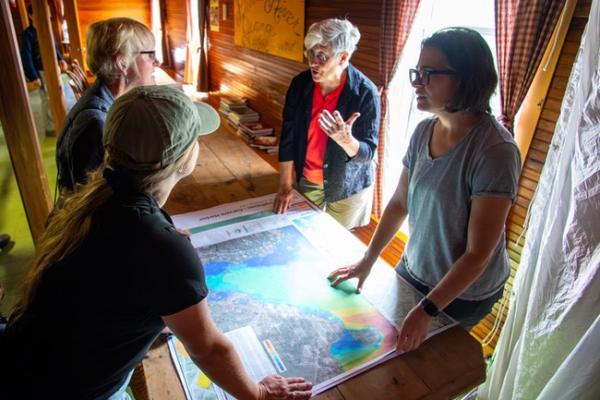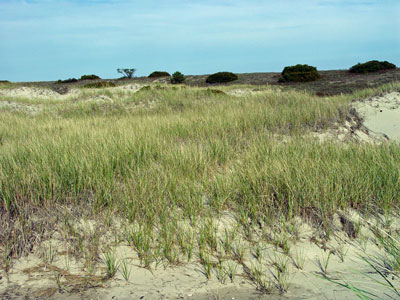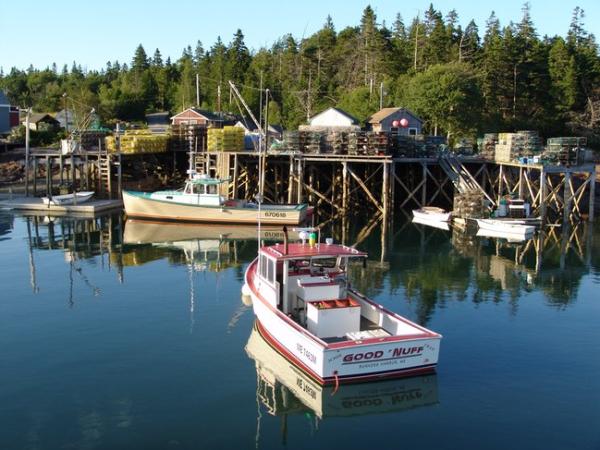NOAA Climate Resilience Regional Challenge
In October 2024, Maine kicked off a major $69 million climate resilience grant, funded through the National Oceanic and Atmospheric Administration’s Climate Resilience Regional Challenge. Funds are being used to protect Maine’s communities, environment, and working waterfronts from extreme storms, flooding, and rising sea levels. The significant Federal grant, awarded to the Governor’s Office of Policy Innovation and the Future, represents one of the largest investments in climate resilience ever in Maine history. Maine was one of 10 states to share a total of $575 million in Federal funding for climate resilience authorized through the Inflation Reduction Act.
Over the next five years, Maine will implement three integrated climate resilience-building strategies that advance the recommendations outlined in Maine Won't Wait (PDF), Maine’s Climate Action Plan, and collectively build the capacity of underserved, rural, and Tribal communities. Strategies include: build enduring community resiliency, reduce climate impacts through nature-based solutions and investments in green infrastructure, and strengthen the resilience of working waterfronts.

Build Enduring Community Resiliency
Grant activities include:
- The Governor’s Office of Policy Innovation and the Future, in partnership with the soon-to-be-established State Resilience Office, will expand support to communities through the Community Resilience Partnership. The Partnership, which now works with over 225 towns, cities, and tribal governments across the state, provides Community Action Grants to support planning and projects to address climate effects, based on priorities identified by local leaders and citizens. Regional support for communities includes establishing a statewide Resilience Collaborative that will provide towns and Tribes with streamlined access to a full suite of services to plan, design, and implement resilience and risk-reduction projects.
- The Maine Department of Transportation will continue to support investments in critical infrastructure projects through the Maine Infrastructure Adaptation Fund, the state’s primary program for identifying, funding, and completing significant construction projects to address serious climate impacts.
- Engineering and design support for 20 local or regional green infrastructure projects that achieve risk reduction potential, regional significance, benefits to vulnerable communities, and identification of aligned federal funding sources for implementation.
- A State Resilience Office will be established within the Maine Office of Community Affairs (MOCA). The Resilience Office will be dedicated to leading cross-agency efforts to enhance climate resilience across the state, especially in communities with significant climate vulnerabilities impacting residents, infrastructure, and the environment.
Photo: Island Institute

Reduce Climate Impacts Through Nature-based Solutions and Investments in Green Infrastructure
Grant Activities include:
- Development of climate risk and assessment tools and decision support resources for Maine’s inland and coastal communities, through collaboration among state agencies, GOPIF, the University of Maine Sea Grant Program, and the Wells Estuarine Research Reserve. Resources include a Maine Coastal Flood Risk Model application guide, compilation of inland flooding tools and resources, coastal saltwater intrusion groundwater monitoring, updated coastal bluff stability maps, updated shoreland zoning publication and maps, living shorelines and coastal bluffs design book, and community and practitioner resilience trainings through a newly established Maine Resilience Training Academy.
- Placement of Maine Shore Corps Stewards around the state to support green infrastructure opportunities, native plantings, stream smart principles, and other tactics to increase resilience, conduct outreach and education about nature-based solutions, and coordinate community science projects to monitor green infrastructure project.
- Demonstration projects to model nature-based solution implementation and regional collaboration across state agencies. Demonstration projects will include a living shoreline stabilization demonstration project, a “Popham Peninsula 2050 and Beyond” demonstration project, and a “Restoring Saltmarsh Habitat and Tidal Function in the West Branch of the Pleasant River” demonstration project.
- A cross-agency permitting forum, to advance climate-related changes to Maine’s permitting process.
- Implementation of a new Climate Resiliency Conservation Fund for land acquisition to address ecological gaps on protected lands, alleviate conservation funding gaps, and leverage significant gains in protecting resilient and biodiverse landscapes, administered by the Maine Coast Heritage Trust.
- Personnel across state agencies and project partners to provide capacity expertise, and technical assistance to Maine communities in resilience planning, coastal hazards, engineering, marine resources, nature-based solutions, and resource biology.
Photo: Maine Natural Areas Program

Strengthen the Resilience of Working Waterfronts
Grant activities include:
- Development of a statewide working waterfront strategy, led by the Maine Working Waterfront Coalition with support from the University of Maine Sea Grant College Program and the Maine Coastal Program.
- Dedicated funds from the Maine Infrastructure Adaption Fund for working waterfront resilience projects that to improve waterfront infrastructure for commercial fisheries, aquaculture, and to meet demand for public access to the coast.
- Implementation of the Seafood Economic Accelerator of Maine Roadmap, including targeted investments to fund energy efficiency conversions in Maine’s seafood industry that will provide greater resilience to climate-related shocks.
Photo: Jeff Dobbs, Maine Office of Tourism
Project Partners
Numerous state agencies and Maine organizations are partnering to implement this grant. In addition to GOPIF, project partners include:
- Maine Department of Transportation
- Maine Department of Marine Resources
- Maine Department of Agriculture, Forestry, and Conservation
- Maine Department of Environmental Protection
- Maine Department of Inland Fish and Wildlife
- Volunteer Maine
- Wells National Estuarine Research Reserve
- University of Maine, Maine Sea Grant
- Maine Development Foundation
- Maine Coast Heritage Trust
Connections Across Maine’s Climate Action Work
The grant supports Maine’s efforts as a national leader in climate resilience among rural states, and the bold goals outlined in Maine Won’t Wait, the state’s award-winning climate action plan, to strengthen Maine’s resilience to climate impacts, grow Maine’s economy through climate action, reduce greenhouse gas emissions, and achieve carbon neutrality Governor Mills has made nationally recognized commitments to tackling climate change, advancing clean energy, and improving the climate resilience of Maine’s nearly 500 municipalities and Tribal governments. This funding will further accelerate and expand Maine’s leadership on climate action by working with communities to take strong, pragmatic steps to address vulnerabilities, protect people, and ensure critical infrastructure is prepared for future impacts.
In May 2024, Governor Mills established the Commission on Infrastructure Rebuilding and Resilience by Executive Order and charged it with recommending strategies to reduce the risk of damage from extreme storms and floods, and actions to improve Maine’s ability to respond and recover when the next disasters hit. The Commission includes State and local officials; representatives of affected communities, businesses, and industries; and experts in infrastructure, construction, engineering, electrical utilities, floodplain management, financing, philanthropy, emergency response, and climate science. In May 2025, the Commission released an Infrastructure Resilience Plan which provides strategies and actions that strengthen infrastructure and reduce disaster risks; improve disaster preparedness, response, and recovery; and sustain Maine’s momentum through strategic investments. The plan is a comprehensive approach to integrate resilience principles deeply into decision-making at all levels of government.
Get Involved
Learn more about past Community Action Grants completed by participants in the Community Resilience Partnership. Future rounds of available funding will be announced on the Partnership website.
Learn about the Climate Resilience Conservation Fund which supports land protection projects that enhance climate resilience and reduce climate impacts on Maine’s land, waters and people. The application period runs through October 22, 2025.
Learn about an upcoming grant opportunity - the Maine Public Working Waterfront Infrastructure Fund - which will support communities to adapt existing public working waterfront infrastructure to reduce vulnerability to climate change, sea level rise, coastal flooding, and other impacts. The Request for Applications is anticipated to open in January 2026 on the Maine Department of Transportation website.
Check back for open grant rounds, education opportunities, links to resources developed throughout the grant, and case studies from completed grant activities.